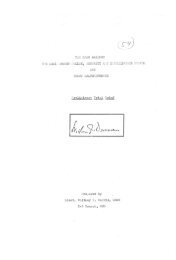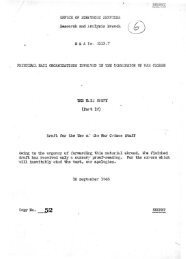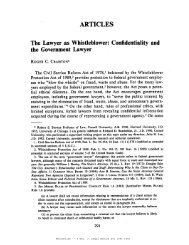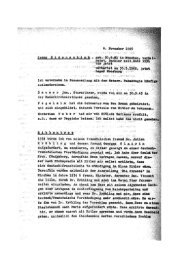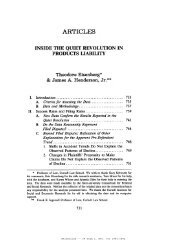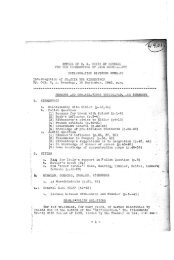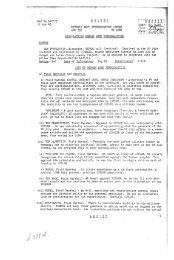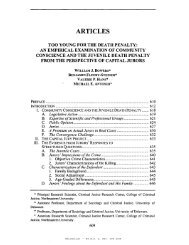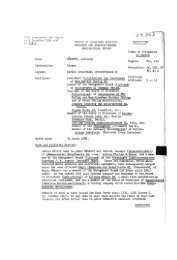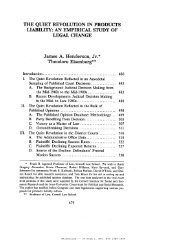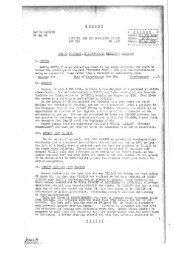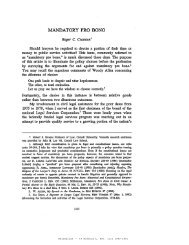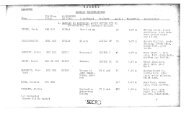Interrogation of SCHELLENBERG, Walter - Cornell Law Library
Interrogation of SCHELLENBERG, Walter - Cornell Law Library
Interrogation of SCHELLENBERG, Walter - Cornell Law Library
Create successful ePaper yourself
Turn your PDF publications into a flip-book with our unique Google optimized e-Paper software.
<strong>Interrogation</strong> <strong>of</strong> <strong>SCHELLENBERG</strong>, Weiter<br />
By Lt.Col.S.W.Brookhart<br />
Time 12, November 1945, AM & EM<br />
Schcllonberg was Chief <strong>of</strong> Amt VI from the autumn 1941 until<br />
the and. He cT^:ii:i.:a -•• eaart uf the ESHA rta <strong>of</strong> the end <strong>of</strong> 1944, and<br />
"ftur aakifig some corrections, agreed that he would swear to its<br />
correctness and would sign it when presented in final form.<br />
Witness first met Ka.ltonbrunner in Vienna j^ist after the Anschluss.<br />
He described the channels through which protective custody arrests were<br />
executed in Austria at that time. For general casos (a) State Eolicc<br />
Command Vienna, (b) Amt VI, (c) Heydrich. In prominent cases the channel<br />
was (a) Inspector <strong>of</strong> the State Eolicc, (b) Higher'Eolico and SS Leader<br />
(Kaltcnbrunnor), and then (c) Berlin. Schellcnborg considers Kaltenbrunncr<br />
responsible for all cases handled in Austria during his service<br />
as Hif-Jicr Eolice and SS Official.<br />
Schcllcnberg next met Kalta::brun:ior in January 1943 when the latter<br />
was appointed Chief <strong>of</strong> thu RSHA. All Arat Chiefs were summoned to Himmler's<br />
headquarters at Loctzen in East Erussia. Himnlcr informed the Amt Chiefs<br />
that Kalte rib ruiuiur was appointed as Heydrich's successor. Schclle.nberg<br />
had the impression that Himmler in no way limited Kaltcnbrunnor's jurisdiction<br />
in his functions. Kaltcnbrunnor was Chief from the beginning and<br />
kept Schcllenberg in the background even when matters <strong>of</strong> his Amt wore discussed<br />
between Hiranlur and Kalte.-'brurmcr. As an example <strong>of</strong> Kaltenbrunncr'a .<br />
exercise <strong>of</strong> authority over his department, Schellttuberg statod that all<br />
important matters from Amt VI had to go through Kaltcnbrunnor's <strong>of</strong>fice<br />
and he had to consult with Knltonbrunnor on an average <strong>of</strong> every three or<br />
four days when there were numerous telephone calls and a vast number <strong>of</strong><br />
memoranda inbetween. During the first months <strong>of</strong> Ka.ltenbrunner's service<br />
as Cnief <strong>of</strong> the RSHA, Schellenb-r^ stated thero were meetings called by<br />
Himmler for all Aßt Chiefs tog-ther with Kaltenbrunner, during which<br />
Himmler emphasized that iOiltcnbrunnur was Heydrich's successor and should<br />
exercise complete control over all the branches.<br />
From the time >f Kaltcnbrumicr's appointment until October 1943,<br />
Schcllenberg's influence with Himmler was limited. From October 1943<br />
until February 1944, when the Can-ris case broke, Schellenberg was persona<br />
grata with Himmler end from the spring 1944 until the end Schellenberti<br />
vvas in close contact with Himmler.<br />
Schellcnberg states that Kaltunbrunaer waa informed <strong>of</strong> all the<br />
discussions he had with HL-inler, but from the middle <strong>of</strong> 1944, he started<br />
to give unclear reports to Kaltcnbrunnor and to withhold information.<br />
He cited as an example that he „ave definitely misleading information on<br />
his astrological influence with Himmler. Schclleuberg stated "I gave nil<br />
reports in the form which best served my interests".<br />
-1-
(<strong>Interrogation</strong> <strong>of</strong> <strong>SCHELLENBERG</strong>, <strong>Walter</strong> ...IS November 1945, AM •& PM ..cont'd)<br />
Following 20 July 1944 and particularly after November and December<br />
1944, Kaltcnbruuner was in direct contact with Hitler, <strong>of</strong>fcoa by-oassing<br />
Himmler. • •<br />
When questioned as to Kaltenbrunner's jurisdiction over the<br />
various Amts, Schellonburg stated that his authority was the same over<br />
all the Amts, With regard to the individual Ants, he st-ted:<br />
AMT I Nothing was done in this Amt without submission to and<br />
approval <strong>of</strong> Kaltenbrunter. Brigaduführer Schulz and Oberführer<br />
Ehrlinger, the leaders <strong>of</strong> this Amt, could certainly<br />
testify to this.<br />
AMT II Kaltenbrunner had a special interest in this Amt because<br />
he was <strong>of</strong> the opinion that money was power, and he wanted<br />
to be informed about the smallest detail. He appointed<br />
SPACIL, an old acquaintance, as Chief <strong>of</strong> the Amt; this mm<br />
had no qualificati d was looked upon by other Amt Chiefs<br />
only as Kaltenbrunncr's paymaster» Kaltcnbrunner delegated<br />
to Spacil all monetary functions. Schellenberg avoided<br />
financial problems which he believes would have been present<br />
in dealing with Spacil by obtaining permission to handle all<br />
Amt VI financial matters within his own Section. Nevertheless,<br />
Schelluaberg had to submit to Kaltenbrunner all cases covering<br />
more than EM 50,000 for either foreign or internal use.<br />
AMT III All reports by this Amt wore submitted to Kaltenbrunncr who<br />
made use <strong>of</strong> them in connection with internal politics.<br />
Schellwnberg believes that Qhlandorf assisted Kaltcnbrunner<br />
to a great extent through his reports. During the first<br />
year in <strong>of</strong>fice, Kaltunbrunnor wanted to remove Ohlcndurf<br />
because he thought the latter was spending too much <strong>of</strong> his<br />
time in the Ministry <strong>of</strong> Economics. Schellenborg says K".ltonbrunner<br />
wished to replace Ohle; dorf •.••ith Ructolf Mildner, an<br />
old friend <strong>of</strong> Kaltenbrunncr's from Vienna. However, Ohlendorf's<br />
reporting agency was <strong>of</strong> such assistance to KalWubruancr that<br />
the removal did not take place.<br />
0hl;-muorf and S<strong>of</strong>culluibur« word not on good terms. Ohlendorf<br />
criticized Schcll&nberg with not being an old time reliable<br />
National Socialist and took occasion to tell him personally<br />
that his character was not reliable and tha* u .o was only<br />
ambitious and that he (Ohlendorf) did not have riny confidence<br />
in him. However, when Ohlendorf in 1944 - 1945 saw that the<br />
developments proved Schclleuborg's pessimistic attitude,<br />
Ohlendorf began to lean upon Sohcllunbexg . Ohlendorf also<br />
criticized Schcllonburg for his failure to take command <strong>of</strong><br />
an Einsatz Group in tne field, and .said this was another<br />
reason why he was unreliable because he had never proven<br />
himself. Schcllcnberg stated he had been asked to take<br />
-2-
(<strong>Interrogation</strong> <strong>of</strong> <strong>SCHELLENBERG</strong>, <strong>Walter</strong> ... 12 November 1945, AM & Bit cont'd)<br />
command <strong>of</strong> such a group but he knew how to dodge it and<br />
did so.<br />
AMT IV Here, Mueller, because <strong>of</strong> his special knowledge <strong>of</strong> the<br />
Gestapo, had muoh independence. However, all important<br />
natters were discussed with Kaltenbrunner. Schcllcnberg<br />
saw Muellur <strong>of</strong>ten, after the daily Amt Chief Meeting, discussing<br />
with Knltenbrunn6r details pertaining to ia.it IV.<br />
After 20 July 19i4 there una a very close co-operation between<br />
Kaltenbrunner and Mueller, but it can in no way be said<br />
that Mueller ran Awt IV independently. In the beginning<br />
Ealtonbrunner was prejudiced against Mueller but in the course<br />
<strong>of</strong> time this obviously changed, and from the end <strong>of</strong> 1943 an<br />
almost intimate connection existed between Kaltenbrunner and<br />
Mueller. Schcllenberg described Mueller as a hunohuan <strong>of</strong><br />
Hcydrich's and said that while he was undoubtedly the strongest<br />
man in the Gestapo, hü was nevertheless subordinate to Kaltenbrunner<br />
as Chief <strong>of</strong> th« BSHA.<br />
AMT V Kaltenbrunner had little interest in criminal matters <strong>of</strong> nonpolitical<br />
nature, but here als«, all important matters were<br />
reported to and decided upon by him. Kaltenbrunuer took a<br />
special interest in corruption cases and wanted to personally<br />
handle cases ef corruption within the Party« As an example,<br />
witness described how a Ortsgrupponleiter from Munich had<br />
been arrested by Ant V sftcr the case had buon prepared by<br />
Amt III. Gauleiter Fieseler intervened and Kaltenbrunner<br />
had a big row with Bonannn. However, he (KaItcnbrunner) had<br />
to give in and the arrested man was released.<br />
AMT VI Witness stated that Section VI-E (Balkan) under WANNECK, and<br />
Section VI-S (Kommandos) under SKORZENY were under the<br />
responsible direction <strong>of</strong> Kaltonbruanor« On paper these<br />
Scctiona belonged to Schollcnbürg, but in reality, because <strong>of</strong><br />
the friendly relations between the Section Chiefs and<br />
Kaltenbrunner, much took place <strong>of</strong> which SchellenbtjrH, was never<br />
informed. Schcllcnbcrg had a continuous fight trying to obtain<br />
information about the actions <strong>of</strong> the groups. In all organizational<br />
matters, regarding both Amt VI and An* Mil, Sohcllonbora<br />
had to defer to Kp.ltenbruruier ! e decisions. This was true ulso<br />
in the relationship between Ant VI ar.d Amt Mil.<br />
AMT VII This viae a small Amt <strong>of</strong> no great'. importance, <strong>of</strong> which<br />
Schellcnberg had little knowledge. It handled archive<br />
materials and clippings and had no field organizations or<br />
operative agents <strong>of</strong> any kind outside the head <strong>of</strong>fice.<br />
Sehcllenberg was <strong>of</strong> the opinion that in protective custody<br />
cases determination to arrest, the step and length <strong>of</strong> internment were in<br />
the hands <strong>of</strong> Kalt cnb runner and Mueller.« That is, the individual oase<br />
-3-
(<strong>Interrogation</strong> <strong>of</strong> <strong>SCHELLENBERG</strong>, »J-It er .... 12 November 19
(IiterrogctiuJi <strong>of</strong> <strong>SCHELLENBERG</strong>, Waltor ... 12 November 19*5, AM & ?M cont'd)<br />
Witness told thu following about'the creation <strong>of</strong> Amt Mil,<br />
It me decided upon about 12 February IJ&Ä^/iftor the Canaris incident,<br />
which was brought about through the desertion <strong>of</strong> Vermehren from K.Oi to<br />
the British in Turkey.<br />
Kaltoabrunuwr once told SChallenborg that Fcgclcin had<br />
suggested to Hitler that Canaris be removed and Himmler bu entrusted<br />
with, the German Intelligence Service. j t&®0jjfa ordered Knltenbrunner<br />
to draft on order to be signed by Hitler' for-thu creation <strong>of</strong> the new<br />
intelligence service. Kaltcnbrun-or went to Posen to discuss matters<br />
with Himmler who was attending a meeting <strong>of</strong>"Govorr.mont Presidents there.<br />
Mueller und Schellenberg, with one expert each, received orders to join<br />
Kaltunbruuner. After discussion, they wore ordered to draft the abovementioned<br />
order.<br />
Mueller and Schcllcnber& disagreed in many points while drafting<br />
the order especially in the wording <strong>of</strong> the paragraph concerning Section 3,<br />
counter-espionage. Mueller wanted this Section for his Amt IV and furthermore<br />
wanted to word the order in such a form that his Amt would have all<br />
the influence on matters <strong>of</strong> counter-espionage. Schellenburg wanted to get<br />
the German Intelligence Service out <strong>of</strong> the claws <strong>of</strong> RSHA.<br />
Finally Schollcnberg'8 drrift consisting <strong>of</strong> three sentences<br />
was approved. Schellenborg names Dr. SANDBERGER, his expert, as witness<br />
to the discussions he had with Mueller. Mueller had tried to obtain<br />
Kaltenbrunner's support but Scholl'nborg'8 draft remained. Knitcnbrunner<br />
took the draft to Himmler, who sent him as his deputy to the Fuenrer with<br />
a draft ready for signature, Schellcnburg believes that Kaltonbrunuer<br />
discussed the order with Kcitel and Jodl and then with Hitler, or perhaps<br />
it was in reverse order. Kcitel and Jodl approved and two or three days<br />
later Hitler signed.<br />
During the first days <strong>of</strong> March, a Biuotiufc, was held in Camp<br />
Zeppelin in Zossen between people concerned with the transfer <strong>of</strong> the foreign<br />
intelligence and counter-intelligence from the old Amt Ausland and Abwehr<br />
to ESHA. General Winter, Chief <strong>of</strong> Central Office <strong>of</strong> Armed Forces, was<br />
Kcitel's representative and presided. Kaltenbrunner and Mueller wanted<br />
the previous agencies to disappear completely and be incorporated in Amt IV<br />
and Amt VI, but Colonel Hanson fre:;i Abwehr and Schellcnberg had agreed to<br />
do their utmost to maintain an Amt Mil. Kaltcnbrunnor ftnd Mueller were<br />
very indignant that Schcllcnburt, opposed their standpoint and on their<br />
return journey Kaltcnbruraier accused Schellenberg <strong>of</strong> having tried to deceive<br />
him.<br />
Long negotiations took place between Schellenberg and Colonel<br />
Hanson, Chief <strong>of</strong> Section 1 (Espionage) and Colonel Freytag von Loringh<strong>of</strong>cn,<br />
Chief <strong>of</strong> Section 2 (Sabotage). Mueller negotiated -with the Chief <strong>of</strong><br />
Section 3 (Counter-espionage). The discussions concerned the set up <strong>of</strong> the<br />
new agency Mil and its relationship to Amt VI, Furthermore, the transfer<br />
<strong>of</strong> finances, personnel, property, disciplinary measures and continuation <strong>of</strong><br />
information service to the Armed Forces. A delay in creation <strong>of</strong> the new<br />
-5-
(<strong>Interrogation</strong> <strong>of</strong> SCHELLENBEEG, <strong>Walter</strong> ... 12 November 1945, AM & PM cont'd)<br />
agency was caused by difficulties regarding.'-front intelligence service<br />
and the difficulty in deciding under whose'jurisdiction <strong>of</strong>ficers and men<br />
transferred into PSHA should be. Questions about recruiting and training<br />
<strong>of</strong> new personnel were also difficult. Ein%$y the negotiations led to an<br />
order which was signed on 12 May 1944 by Keitel as Chief <strong>of</strong> OKW and Himmler<br />
as Supreme Chief <strong>of</strong> the new Intelligence Service, and the new set up became<br />
effective. About 14 or 15 May 1944, a throve Äay meeting was held in Salzburg,<br />
attended by all senior and important^<strong>of</strong>ficers <strong>of</strong> the Amt Ausland and<br />
Abwehr, Keitel and Himmler talked. Kalienbrünner gave a speech. Schellenberg<br />
gave a scientific lecture.<br />
After 20 July 1944, Hansoir" "'was. not there". Kaltenbrunner<br />
wanted to dissolve Amt Mil and morge it with Amt VI, but Schellenberg<br />
succeeded in preventing this and took over the handling <strong>of</strong> Ant Mil<br />
temporarily. There was no change in Kaltenbrunner's influence.<br />
July - August 1943, Schellenberg had made an exhaustive study<br />
<strong>of</strong> Russia and its war potential. Because <strong>of</strong> this memorandum, Schcllcnborg<br />
and his counselors were accused <strong>of</strong> defeat'ism by Kaltenbrunner and it was<br />
only through SchcLUuburg's influence with Himmler that his removal to a<br />
concentration camp was avoided.<br />
In November 1943, Schollenberg had discussed with an American,<br />
Howitt, in Stockholm,the possibilities <strong>of</strong> negotiating peace. Kaltenbrunner<br />
destroyed Schellenberg's attempts,<br />
Schellenberg believes that Einsatz Groups and Commandos were<br />
always formed in connection with the occupation <strong>of</strong> foreign countries. He<br />
assumes that the first groups were formed in the Balkans. In the ^est Amt<br />
Canaris was active. Somewhat later Heydrich admitted that Security Police<br />
and SD were used there but not as Einsatz Groups.<br />
About the end <strong>of</strong> May or beginning <strong>of</strong> June 1941, Schellenbcrg<br />
took part in discussions in Berlin concerning operations <strong>of</strong> Einsatz Groups<br />
within the frame work <strong>of</strong> the Army. Cuartermaster Corps General Vfegner<br />
represented the Army at these discussions. It was decided how the Security<br />
Police and the SD wore to operate. The operational area <strong>of</strong> the Army was<br />
divided into threo sectors: front, rear operational area, and rear Army<br />
area. In front area, the commandos were subordinated to the Army as well as<br />
to to operations as to supply. In the roar operational area, the Security<br />
Police and SD were independent as to operations but under the Army the<br />
questions <strong>of</strong> supply. In the rear Army area, which already was under civilian<br />
rule, the Einsatz Groups and Commandos wore completely independent <strong>of</strong> the<br />
Army j<br />
-6-





